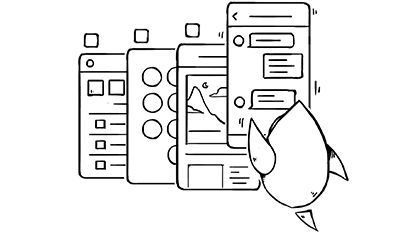In today’s digital landscape, businesses must constantly adapt to evolving customer demands, rapid technological changes, and intense market competition. This fast-paced environment forces organizations to rethink their operations, with technology playing a pivotal role in driving innovation and maintaining a competitive edge.
For CTOs and technology leaders, investing in custom mobile solutions isn’t just about keeping up with trends—it’s about equipping teams with the right tools to work smarter and positioning the business for sustainable growth.
Why Custom Mobile Solutions Make Sense
Unlike one-size-fits-all applications, custom mobile solutions are built specifically for an organization’s unique needs. They are designed and developed to integrate smoothly with existing workflows, reduce inefficiencies, and scale as technology and business evolve. More importantly, they allow companies to maintain control over critical data, security, and user experience. Here are some reasons why enterprises are increasingly opting for custom mobile applications.
Boosting Efficiency and Productivity
Custom mobile applications help businesses streamline their operations by cutting down on repetitive tasks and automating essential workflows. Consider a field service management company that relies on technicians in the field. A tailored mobile app can provide real-time job updates, navigation assistance, and instant access to equipment manuals—reducing downtime and improving the quality of the service.
Similarly, a logistics company could use a custom app that tracks deliveries in real time, optimizes routes based on traffic conditions, and alerts drivers about schedule changes, leading to faster and more accurate deliveries. Retail businesses can leverage custom mobile applications to manage inventory in real time, allowing store managers to track stock levels, automate reordering, and prevent shortages. In healthcare, hospitals and clinics can utilize mobile apps to enable remote consultations and facilitate appointment scheduling, improving operational efficiency.
By integrating automation tools, businesses can eliminate manual processes, speed up approvals, and allow employees to focus on high-value work instead of administrative tasks. The result is a more agile, responsive, and productive workforce, with fewer errors and better decision-making capabilities.
Seamlessly Integrating with Existing Systems
Most enterprises use a combination of software tools, from customer relationship management (CRM) platforms to enterprise resource planning (ERP) systems. A custom mobile solution can ensure that all these systems communicate effectively, creating a unified experience for employees and customers.
For example, a manufacturing company might use a mobile dashboard that connects with IoT sensors on the production floor, offering real-time insights into machine performance and predictive maintenance alerts. This could prevent costly equipment failures and reduce downtime, letting teams proactively schedule repairs.
Similarly, a retail enterprise could integrate a custom mobile app with its point of sale (POS) and inventory management system. This would enable store employees to check stock availability in real time, place restock orders on the go from its warehouse, and provide personalized recommendations to customers based on purchase history.
In the financial sector, a bank could offer customers a mobile solution that integrates with its core banking software, enabling seamless fraud detection. The app could instantly flag suspicious transactions, provide real-time alerts, and allow customers to approve or deny transactions with a single tap, reducing fraud risk and enhancing user confidence.
In healthcare, a mobile app tailored for hospitals could facilitate real-time communication between care teams and help ensure patients receive timely treatment. Integrated with existing systems, the app could give nurses access to updated medication schedules and patient histories, eliminating the need for paper records that can slow down care.
This kind of integration not only improves decision-making but also enhances operational flexibility, enabling enterprises to work smarter, respond faster, and provide better services to their customers.
Strengthening Security and Compliance
As cyber threats become more sophisticated and industry regulations tighten, businesses must take a proactive approach to security. Generic software solutions often include baseline security measures, but these may not fully address an organization’s specific needs or comply with changing industry regulations. Custom mobile applications allow businesses to build security from the ground up, implementing features such as end-to-end encryption, biometric authentication, and role-based access controls tailored to their workflows.
For example, a financial services company processing customer transactions could have an app with multifactor authentication and AI-driven fraud detection, ensuring compliance with federal regulations while actively preventing unauthorized access. A healthcare provider might use a mobile solution that enables doctors to securely access patient records while maintaining strict HIPAA compliance, reducing the risk of data breaches. Likewise, a logistics firm managing supply chain data can use blockchain-backed security measures to ensure the integrity and confidentiality of shipment records.
With security solutions tailored to their industry and operations, enterprises can reduce risk, protect sensitive information, and meet compliance requirements without compromising usability or efficiency.
Delivering a Personalized User Experience
A well-designed mobile app isn’t just functional—it plays a crucial role in shaping a company’s brand identity and customer perception. Employees can benefit from interfaces tailored to their specific roles, while customers experience a seamless and highly personalized interaction with the brand. A custom mobile solution ensures that every touchpoint aligns with a company’s values, aesthetics, and user expectations, reinforcing trust and brand loyalty.
Take the construction industry as an example: Companies can use augmented reality/virtual reality (AR/VR) mobile applications to provide immersive training programs, allowing workers to practice handling machinery in a virtual environment before stepping onto the construction site. This investment in personalized practice environments would improve the company’s overall performance and reflect on its commitment to innovation and employee well-being.
In healthcare, AI-powered features like predictive analytics can help doctors identify patterns in patient data, giving them insights into potential health risks and improving preventative care strategies. Other smart features, such as bed departure detectors that alert caregivers when high-risk patients attempt to leave their beds, can help reduce hospital-related falls and improve patient safety.
In retail, custom mobile apps can create highly personalized shopping experiences. Imagine an app that remembers a customer’s past purchases and suggests items they might love based on their preferences and shopping history across multiple platforms. For example, a department store app could use machine learning to recommend clothing styles tailored to a customer’s past selections and sizes. Taking it a step further, retailers could integrate AR/VR technology, letting customers virtually try on clothing and accessories from the comfort of their own space—complete with accurate fit and measurements—making shopping more convenient and engaging than ever.
No matter the industry, custom mobile solutions empower companies to craft a digital experience that authentically represents their brand identity, values, and mission. A well-designed mobile application becomes an extension of the company itself. By tailoring features to meet specific business needs and customer expectations, organizations can strengthen engagement, improve efficiency, and differentiate themselves in a competitive market. More than just a tool, a custom mobile solution is an opportunity to build deeper connections with users, foster loyalty, and showcase innovation in a way that truly aligns with what the company stands for.
Preparing for Future Growth
Businesses evolve, and their technology should be able to grow with them. Many off-the-shelf solutions become limiting as technology evolves and companies expand or introduce new services, forcing businesses to work around software rather than having software work for them. Custom mobile applications, on the other hand, can be designed with the latest technology and scalability in mind, ensuring they continue to meet the organization’s needs as it grows and diversifies.
Take the real estate industry. For years, agents have relied on off-the-shelf software to show their listings. With the introduction of new technology, like AR/VR, agents could offer detailed virtual tours of their listings to clients all around the globe as if they were there by their side.
In the hospitality industry, a hotel chain might first introduce a custom mobile solution for room bookings, then evolve it into a digital concierge service that offers personalized recommendations, in-room controls for smart devices, and streamlined check-in and check-out via mobile key access. In construction, a company could use an app that initially tracks employee schedules but later expands to include drone-based site inspections, real-time collaboration tools for project managers, and integration with supply chain management systems.
This adaptability ensures that custom applications remain valuable over time, supporting industry-specific needs and evolving with business growth rather than requiring a costly switch to an entirely new system.
The Future of Custom Mobile Solutions in Enterprise Innovation
The pace of technological change is accelerating, and enterprises that embrace innovation will be better positioned for success. Emerging technologies like artificial intelligence, machine learning, augmented reality, virtual reality, and the Internet of Things are transforming how businesses operate. Custom mobile applications can integrate these advancements to enhance workflows, automate decision-making, and create more efficient resource management.
Take Apple’s Vision Pro headset, for example. With custom iOS applications, businesses in industries like construction, real estate, healthcare, manufacturing, retail, education, and more can leverage immersive experiences for training, real-time collaboration, and remote assistance. Whether it’s surgeons rehearsing complex procedures using AR overlays or factory workers receiving hands-free instructions via VR, these innovations will redefine how work gets done.
Conclusion
Custom mobile solutions aren’t just about upgrading technology—they’re about laying the groundwork for long-term success. Organizations that invest in tailored mobile applications can streamline operations, improve security, and deliver seamless, user-friendly experiences that reflect their unique vision and values. These solutions can unify internal workflows, support collaboration, automate key tasks, and provide real-time insights that lead to smarter and faster decisions.
As the pace of change accelerates, custom mobile apps empower businesses to adapt, innovate, and stay resilient. Whether it’s leveraging AI for predictive analytics or using AR/VR for immersive training, the right mobile solution helps enterprises navigate disruption and lead with confidence. For CTOs and technology leaders, the key isn’t deciding whether custom mobile is a good investment—it’s determining how to best use it to drive transformation.
At MartianCraft, we understand that no two organizations are alike. We work with businesses to build mobile solutions tailored to their goals, challenges, and industries. Whether you’re looking to modernize your internal systems, enhance customer engagement, or explore new digital possibilities, we’re here to help you take the next step.


